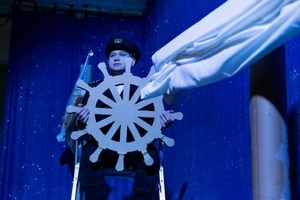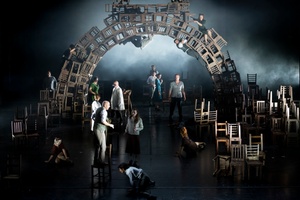PHOTO:
© Bettina Stöß
Madama Butterfly
In the organizer's words:
Puccini's "Japanese Tragedy" is not only one of the most highly emotional works of musical theater, but also a relentless critique of imperialism as a system. The 18-year-old Cio-Cio-San becomes the victim of an uncaring patriarchy and a chauvinism that tramples on the values of other cultures. ... Conductor: Ivan Francesco Ciampa / Yi-Chen Lin; Director: Pier Luigi Samaritani; With Elena Stikhina / Asmik Grigorian, Karis Tucker / Irene Roberts, Jonathan Tetelman / Joshua Guerrero, Markus Brück / Dong-Hwan Lee, Burkhard Ulrich / Gideon Poppe et al.The American Lieutenant Pinkerton has anchored his ship in the harbor of Nagasaki. To pass the time, he has courted the only 15-year-old geisha Cio-Cio-San, called Butterfly, who comes from a noble but impoverished family and takes her love very seriously. Pinkerton wants to enter into a "temporary marriage" with her - not unusual at the time between European men and geishas - and even selects a small house for their joint honeymoon, supported by the matchmaker Goro. When the American consul Sharpless warns him against this marriage, he makes fun of his friend and even toasts the day when he will celebrate his "real" wedding with an American woman. For the young Japanese woman, who has even converted to the faith of her lover out of love, the union with the foreigner has painful consequences: she is disowned by her family after the marriage ceremony is performed. Only with difficulty does Pinkerton succeed in comforting his "butterfly".
Three years have passed. With her faithful servant Suzuki and her small child, Cio-Cio-San leads a life of seclusion. She rejects all attempts by Prince Yamadori to ask her to marry him, because she unwaveringly believes in Pinkerton's return. When Sharpless finally arrives with a message from Pinkerton asking him to prepare her for his imminent return to Nagasaki and his marriage in the meantime to the American Kate, he is shocked to discover that she has a child. He does not dare to carry out his mission and only tells her of Pinkerton's arrival. Cio-Cio-San is happy. Together with Suzuki, she decorates her house, puts on her wedding dress and awaits her lover.
When Pinkerton arrives at the door with his wife Kate and the consul, Suzuki learns the whole truth. She is to persuade Butterfly to give up her child. Pinkerton does not want to face her personally and runs away. Butterfly catches sight of the strange woman, and suddenly realizes that Pinkerton has not come to return to her, but to take the child away. She asks for a half-hour delay and says goodbye to her little son. Then she puts an end to her life.
"There are opposites in theater: arousing interest, surprising and stirring. What do I have to do with heroes and immortal figures? I am not comfortable in such surroundings. I am not a musician of the big things, I feel the small things, and only they I love to treat. That's how I liked Manon, because she was a girl of heart and nothing above it ... And that's how I liked Butterfly, because she is such a clear, feminine thing, but knows how to love to death." Throughout his life, Puccini called MADAMA BUTTERFLY his favorite and also his best work. In fact, it corresponds to his self-chosen maxim of the "music of small things" almost masterfully. Finely chiseled musical details, a captivating melodicism in the voice leading, unobtrusively inserted exotic elements and a sensitive mixture of timbres in the orchestra have not only made the work immortal with the audience, but also made it a model for many composers of the following generations - as, by the way, also Puccini's other operas. However, the success of the opera with the audience came only after some changes made by the composer. In its revised form, the opera was performed for the first time in Brescia on May 28, 1904. It had now been expanded from the original two to three acts; the interlude between the second and third acts with the famous "Summ-Chor" was also added. Deutsche Oper Berlin's production focuses on the tragedy of the young woman who remains true to her love, even when it seems hopeless to everyone else. In the atmospheric, never folkloristic stage setting, the magic of this work unfolds in a particularly impressive way. This content has been machine translated.










